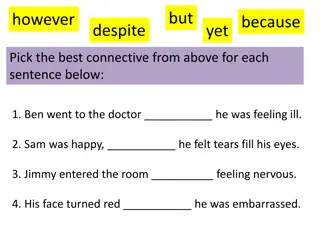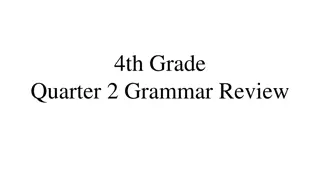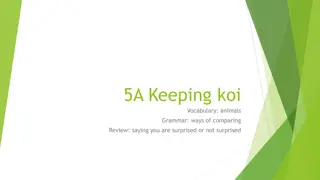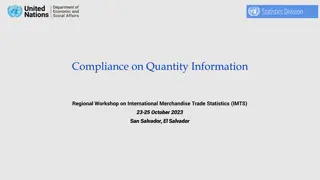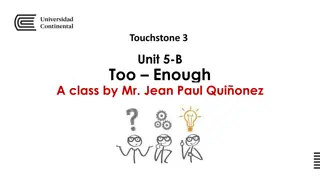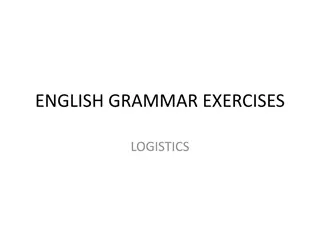Exercises on Expressing Quantity with Some and Any in English Grammar
Practice various exercises related to expressing quantity using "some" and "any" in English grammar. The exercises include asking for items, offering food, completing sentences, and using modal verbs correctly. Improve your language skills with these interactive exercises.
Uploaded on Jul 29, 2024 | 0 Views
Download Presentation

Please find below an Image/Link to download the presentation.
The content on the website is provided AS IS for your information and personal use only. It may not be sold, licensed, or shared on other websites without obtaining consent from the author. Download presentation by click this link. If you encounter any issues during the download, it is possible that the publisher has removed the file from their server.
E N D
Presentation Transcript
D I G Expression of Quantity Exercise 16: Write sentences with some . 1. (Ask for coffee ) Could I have ______________? 2. (Offer bread ) Would you like ______________? 3. (Offer rice ) 4. (Ask for more milk ) ________________________. 5. (Ask for coffee ) ________________________. 6. (Ask for potatoes) ENG M.2 Sem. 1 Grammar I ________________________. T A L ________________________. 4.0
D I G Expression of Quantity Exercise 17: Put the beginnings and ends together. 1. I was tired, so I went to bed without 2. In August we had garden. 3. He never does . C. Some rain. 4. You re hungry. I ll make you ENG M.2 Sem. 1 Grammar . A. any rain I . B. any work in the T A . D. any supper. L 4.0
D I G Expression of Quantity Exercise 17: Put the beginnings and ends together. 5. I finished the work without __________. E. any help. 6. I m going to do __________ . F. Some work in the house. 7. In February we hardly had __________. G. Some supper. ENG M.2 Sem. 1 Grammar I T A L 4.0
D I G Expression of Quantity Exercise 18: Complete the sentences. Use some or any without a noun. 1. I didn t take any pictures, but _________________________(Amy / take) 2. Do you need any money? No, thank you. _________________________. ( I / have) 3. Where your luggage? _________________________. ( I / not / have) ENG M.2 Sem. 1 Grammar I T A L 4.0
D I G Expression of Quantity Exercise 18: Complete the sentences. Use some or any without a noun. 4. Are there any cookies? _________________________. ( there / be) 5. You can have some, but _____________________. ( I / not / want) 6. The tomatoes weren t very good, so _____________. ( I / not / buy) 7. There were some nice oranges at the store, so _____________________. ( I / buy) 8. Can I borrow some money ? Sorry , _________________________. ( I / not / have) ENG M.2 Sem. 1 Grammar I T A L 4.0
D I G E M 1 . 2 S E N G I T A Modal Verb L 4.0
D I G ENG M.2 Sem. 1 Grammar Modal verbs present and future Modal verbs (auxiliary verb) (main verb) can, could, will, would, may, might, shall, should and must. I T A L 4.0
D I G ENG M.2 Sem. 1 Grammar Modal verbs present and future Modal verbs - Modal verbs 2 (NOT He can will meet you tomorrow.) - Modal verbs infinitive without to (NOT He must to meet you tomorrow.) I T A L 4.0
D I G ENG M.2 Sem. 1 Grammar Modal verbs present and future Modal verbs - Modal verbs 3 ( s) (NOT He cans meet you tomorrow.) - Modal verbs ing -ed (NOT I,m sorry I canned not meet you yesterday.) - Modal verbs verb to be do/does. (NOT Do can you meet me tomorrow?) I T A L 4.0
D I G ENG M.2 Sem. 1 Grammar Modal verbs present and future Modal verb not modal verb ( n t). Can I ? I cannot (can t) Could I ? I could not (couldn t) I T A L 4.0
D I G ENG M.2 Sem. 1 Grammar Modal verbs present and future Will I ? Would I ? May I ? Might I ? Shall I ? Should I ? Must I ? I will not (won t) I would not (wouldn t) I may not I might not I shall not (shan t) I should not (shouldn t) I must not (mustn t) I T A L 4.0
D I G ENG M.2 Sem. 1 Grammar Modal verbs present and future Modal verbs Modal verb I T A L 4.0
D I G ENG M.2 Sem. 1 Grammar Modal verbs present and future Ability ( ) can can t ( cannot ). I can swim. I T A Can you swim? L 4.0
D I G ENG M.2 Sem. 1 Grammar Modal verbs present and future Ability ( ) Pronunciation ( ): can is normally unstressed/k n/, but is stressed for emphasis /k n/. A: Can you speak Chinese? B: No, but I can speak Japanese. I T A L 4.0
D I G ENG M.2 Sem. 1 Grammar Modal verbs present and future Ability ( ) be able to can Be able to Will you be able to help me move my furniture tomorrow? I T A L 4.0
D I G ENG M.2 Sem. 1 Grammar Modal verbs present and future Ability ( ) can can t Can I leave early, please? I can t come skating tomorrow. I T A L 4.0
D I G ENG M.2 Sem. 1 Grammar Modal verbs present and future Certainty and uncertainty ( ) 100% certainty ( ) 95%-100% deduction ( ) 80% expectation ( ) 30%-70% uncertainty ( ) may, might, could 0% certainty ( ) I T A will must, can t should L won t 4.0
D I G ENG M.2 Sem. 1 Grammar Modal verbs present and future Certainty and uncertainty ( ) She can t be in Italy! I saw her today! (I m sure she isn t it s impossible.) should They should arrive here at about 6.30. I T A L 4.0
D I G ENG M.2 Sem. 1 Grammar Modal verbs present and future Certainty and uncertainty ( ) may, might could I may not have time to finish tonight. know) President Jims might win the next election. possible) I may/might have some news for you next week. (perhaps I will) He could be stuck in the traffic. (perhaps he is) I T A (I don t (it s L 4.0
D I G ENG M.2 Sem. 1 Grammar Modal verbs present and future Obligation ( ) must have to I must finish my homework before 8.00. I have to phone Jan at 9.00. I T A L 4.0
D I G ENG M.2 Sem. 1 Grammar Modal verbs present and future Obligation ( ) Have to , has to modal verb Elsa has to leave now. Why does she have to go? You don t have to do it. I T A L 4.0
D I G ENG M.2 Sem. 1 Grammar Modal verbs present and future Obligation ( ) must have to must have to . I T A L 4.0
D I G ENG M.2 Sem. 1 Grammar Modal verbs present and future Obligation ( ) - have to At our school, we have to wear a uniform. Every player in a football team has to have a number. When the traffic lights are red, you have to stop. I T A L 4.0
D I G ENG M.2 Sem. 1 Grammar Modal verbs present and future Obligation ( ) - have got to have to. - must You really must stop working so hard and try to relax. You must be here by 8.00, or the bus will leave without you. must to . I T A L 4.0
D I G ENG M.2 Sem. 1 Grammar Modal verbs present and future Obligation ( ) mustn t don t have to - mustn t (prohibited/forbidden) You mustn t cross the road when the red light is showing. - don t have to You don t have to turn to the central heating. It s I T A L 4.0





















